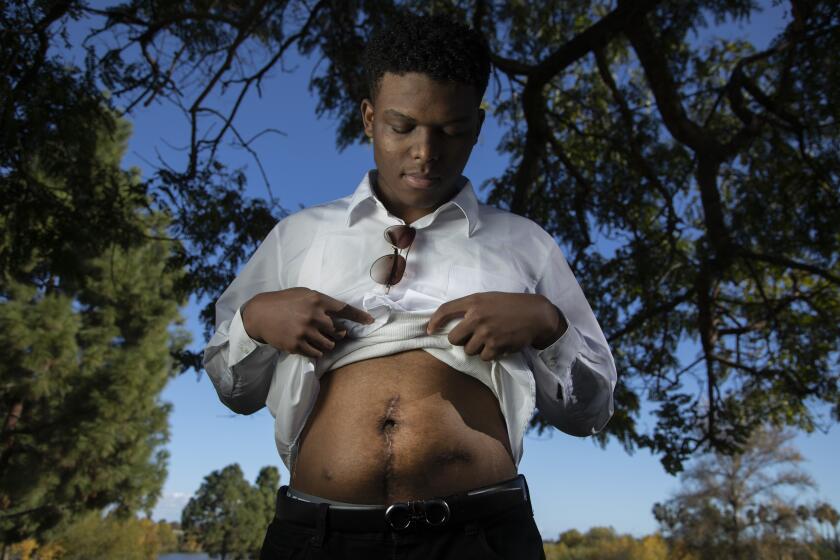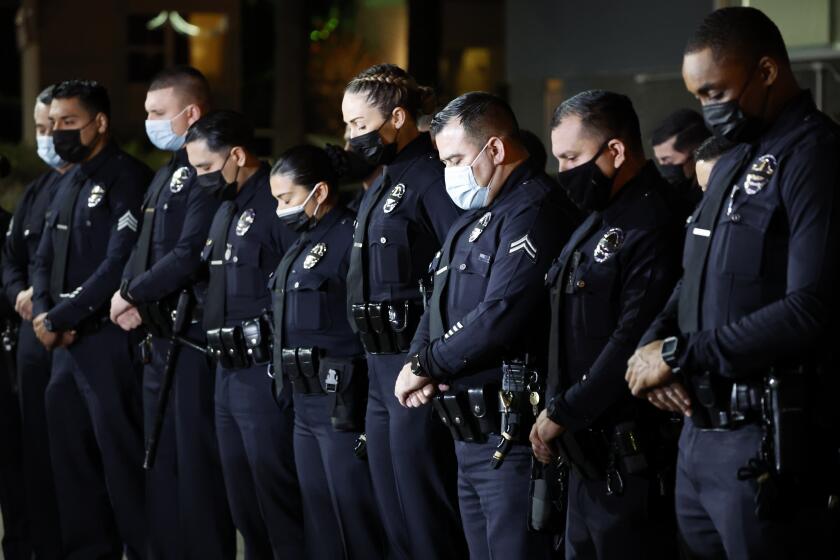Fernando Arroyos returned to his native L.A. to be a cop, and fell to the city’s violence
- Share via
When Los Angeles police Lt. Rex Ingram first read a police report written by Officer Fernando Arroyos, he realized the young L.A. native and newbie on the force was something special.
For starters, he could write better than most of his LAPD peers, and some of his bosses.
“So, I asked him where he went to school, and he, being humble, says ‘LAUSD’” — or L.A. public schools — Ingram recalled. “And I reply, ‘Which college?’ And he says, ‘Cal Berkeley.’”
The anecdote — of a humble man, back in his hometown after going off to college, still shy about his accomplishments even though they shined through in his work — came back to Ingram in a moment of mourning this week, after Arroyos was gunned down Monday night on a South L.A. street not too far from where he grew up.
Like many in L.A. who are fatally shot in robberies and other senseless gunfire, Arroyos, 27, was of this city, a young man of color with a full life to live, only to have it snatched away. Also like others killed here — there were 397 homicide victims in 2021, a 15-year high — he left behind family, friends and co-workers, who now wonder: Why him?
Nearly 400 people have been killed in L.A. in 2021, marking a 50% increase since 2019 and the loss of 15 years of progress driving down such violence.
“I want to remember my son as a hero because of his work,” said Arroyos’ mother, Claudia Karin, in an interview with KABC-TV Channel 7. “Like the [police] official who reached out to me said, there weren’t words for this, because he was a good police officer.”
Beyond the job, though, her son was more, she said.
“As a son, he was the best. As a grandson, he was the best.”
“I loved him like my own son,” Arroyos’ stepfather, Jose Reyes, told the TV station. “He was a polite young man. He was always great with me. We never argued.”
Amid a wave of attention around Arroyos’ killing, the family asked for no more interviews — for space and time to deal with their loss.
Online, activists and police critics who didn’t know Arroyos but take issue with the Los Angeles Police Department’s legacy of abuses have tried to dismiss his death, lobbing out assumptions about its cause based on little more than their own negative perceptions of the LAPD and anyone who joins it.
Many in L.A., however, simply saw another life gone in another burst of violence in a time of too much death, both from street shootings and COVID-19 and everything in between.
Dozens of flower bouquets and lighted candles set under a white canopy marked a memorial in the courtyard outside Arroyos’ parents’ Leimert Park apartment on Thursday.
Arroyos’ neighbor Benedict Bernardez, 52, said he was still in disbelief as he peered out of his second-story home toward the open courtyard, where he and Arroyos would sometimes work out together.
“When his mother called me a couple of days ago and told me the news, I was shocked,” said Bernardez, who has lived in the complex for eight years. “He was a such a good kid, a quiet kid.”
Robert Schafer, who said he taught Arroyos science at Crenshaw High School, lamented his death as a senseless loss for the city and for so many who knew him in a Facebook post that circulated among other L.A. Unified staff.
Federal prosecutors charged four people with killing Officer Fernando Arroyos as a violent crime in aid of racketeering for the Florencia 13 gang.
“He was a good, hard-working student and a man of character,” Schafer wrote. “All the work he put into being his best self and achieving [his] dreams, and all the help and support of family, friends, colleagues and teachers who happily took the opportunity to encourage and guide such a promising young man, were erased in seconds by a gang of murderers and thieves who ended this beautiful man’s life over the most trivial things.”
Mario Quijada, another Crenshaw High teacher at the time, coached Arroyos through the Students Run L.A. program, which teaches kids to set goals through training for a marathon. Arroyos was always serious and diligent, working his way up to run a half-marathon, Quijada said.
“He stood out. He would wear like, ties — things kids don’t do. He would be very professional, wear a tie, a blazer,” said Quijada, now an assistant principal at another school. “He was just trying to find his way.”
LAPD Chief Michel Moore said Arroyos was off-duty and out with his girlfriend looking at a home to buy in the Florence-Firestone neighborhood when three suspects rolled up in a car and exchanged words — and then gunfire — with the young officer. Moore described it as an attempted robbery.
The Los Angeles County Sheriff’s Department quickly arrested four suspects in connection with the killing, and on Thursday federal prosecutors charged all of them — Jesse Contreras, 34; Ernesto Cisneros, 22; Luis Alfredo de la Rosa Rios, 27, and Haylee Marie Grisham, 18 — with murdering Arroyos in aid of the Florencia 13 gang.
The complaint alleges the group robbed and murdered Arroyos “to increase and maintain position” within the gang. Investigators said they had spotted Arroyos wearing chains around his neck, and decided to rob him of them.
Moore said Arroyos yelled for his girlfriend to run, and was defending her when he fell. He said Arroyos died a hero. The head of the civilian Police Commission called the assailants cowards.
Arroyos grew up in a household with his mother, grandmother and stepfather, attended 42nd Street Elementary School and Audubon Middle School, graduated from Crenshaw High in 2012, went off to Berkeley and earned a degree there in legal studies in 2016, and then returned home to L.A.
At a time of intense scrutiny around the policing profession, he wanted to become a cop, and to do it in his hometown. Colleagues said he’d joined the force for all the right reasons.
Others lamented his loss when they saw his face, still skinny, under his big policeman’s hat, in an image released by the department after his death.
Darneika Watson, who was the principal at 42nd Street Elementary when Arroyos was a student there, said she remembered him well when she saw his police headshot. He was older in the picture, of course, but looked much the same as the kid she once knew.
“His face was so sweet,” she said. “He was a quiet, sweet child. Gentle spirit.”
Watson, known as Dr. Davis when she served as principal at 42nd Street for eight years, is now chief human resources and operations officer for Glendale Unified School District. She has 28 years in education total, has known countless children. And yet Arroyos, and his family, stand out clearly in her mind, she said.
He was “no trouble, no problems,” the type of kid who was quiet but still participated in class. And Arroyos’ mother was always sweet in the more limited interactions they had, too, outside the school for morning meet-and-greets, Watson said.
“Just a very responsible family. Nothing but wonderful sentiments and memories about this family, and especially about him,” she said. “I can’t say enough how sweet of a kid he was.”
Bernardez, the neighbor, said he would often see Arroyos work out in the courtyard after dark, after pulling a late-night shift.
“He was very dedicated to his fitness and strength training,” he said.
The two occasionally lifted weights together, on a bench press chained to a fence toward the back of the courtyard, not far from the makeshift memorial in his memory.
“This was a young man who was smart and strong and could have accomplished a lot in life,” Bernardez said. “Why this happened, I’ll never know.”
Over a five-foot cinderblock wall from the courtyard stands the Acacia Learning Center, an after-school institute dedicated to children with autism and intellectual disabilities. It’s from there that Debra Penson, a 22-year program coordinator, said she watched Arroyos grow up.
“He seemed to be very quiet and maybe a little shy,” Penson said. “He mostly kept to himself.”
Then, about three years ago, right about the time Arroyos joined the LAPD, Penson saw the boy she knew back home again — and different.
“A big, strong, but very respectful, upright and polite man came back,” Penson said. “Honestly, I thought he went to the Army.”
Penson said the pair only spoke occasionally, and briefly, but she had come to admire how he’d matured.
“I was proud that he had a passion in his life,” she said. “It’s really sad what happened.”
More to Read
Sign up for Essential California
The most important California stories and recommendations in your inbox every morning.
You may occasionally receive promotional content from the Los Angeles Times.



















